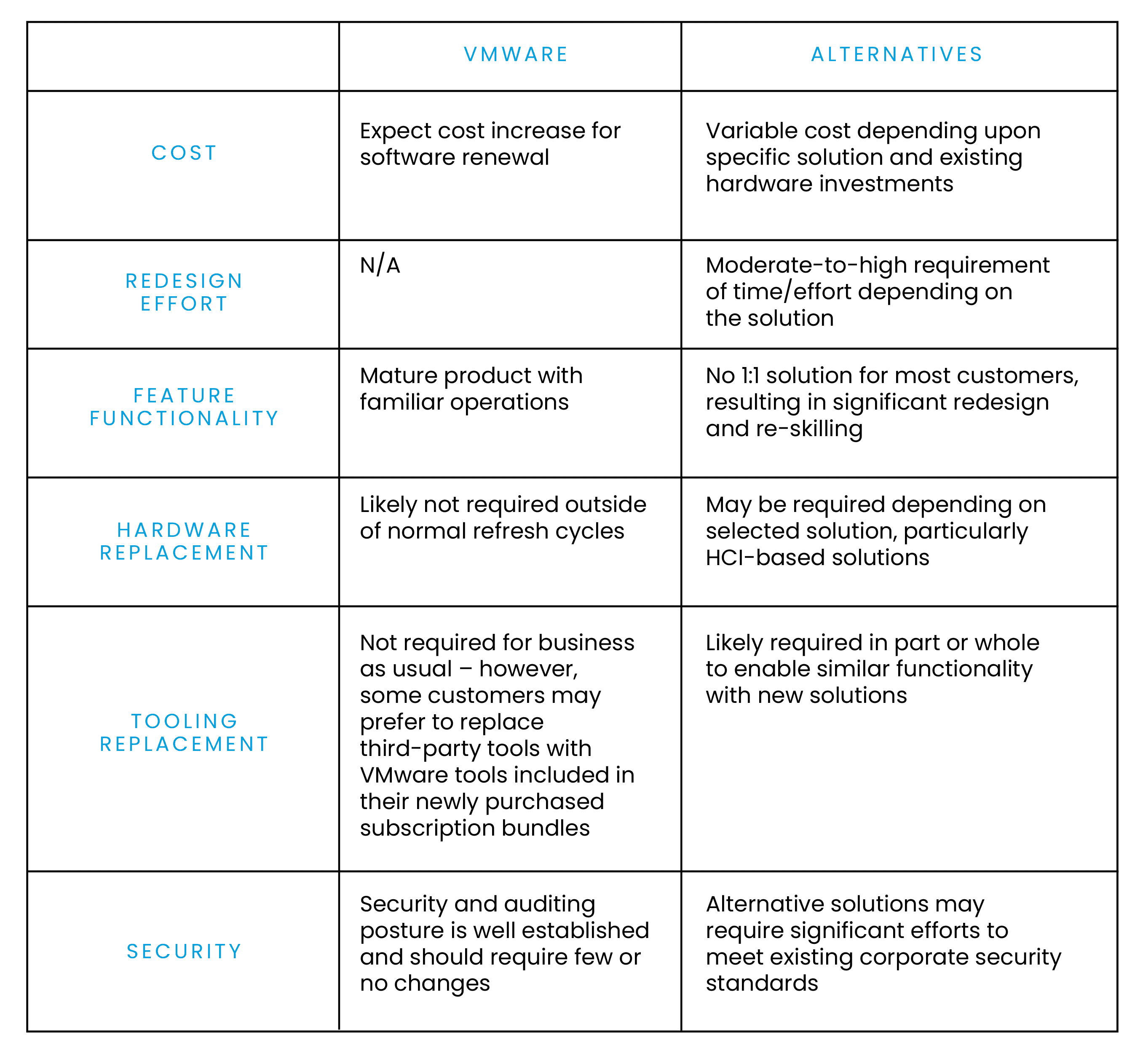BREAKING DOWN THE IMPACTS OF BROADCOM'S VMWARE ACQUISITION

In November 2023, Broadcom completed its acquisition of VMware after an 18-month negotiation and regulatory approval process. This acquisition brought—and continues to bring—significant changes to the route to market for VMware software, with Broadcom immediately halting sales of perpetual licensing and providing only a few select subscription bundles available for purchase. These changes have left many enterprises with a decision to make regarding their hypervisor. And with only a handful of alternatives in the market, it’s a decision that must be made after careful consideration of the downstream impacts. In this article, we’ll explore the line of thinking that organizations must adopt regarding these changes and weigh the advantages and disadvantages that may result depending on which path they decide to take.
Operating Model Over Product
First and foremost, it is vital for enterprises to frame their deliberation and eventual response to this acquisition as an operating model conversation rather than just a product swap. Enterprises have designed their tech infrastructure around the VMware hypervisor for over 15 years, and changes in the hypervisor will have multiple impacts that need to be considered:
- Financial Impact: Top of mind for most business leaders are the potential financial impacts, which include the cost of software acquisition, new hardware purchases, and the inability to use existing hardware and software investments that have not been depreciated.
- Architectural Impact: Organizations may find that familiar architectural models (e.g., 3-tier) may no longer be available with their chosen replacement solution. Software that is designed to integrate with VMware vSphere may not support other hypervisors and thus require replacement (e.g., backup, disaster recovery, monitoring, etc.).
- Operational Impact: Operationally, it will also be common for application vendor support of non-VMware hypervisors and partner ecosystems to be extremely limited. Further, the limitations on feature functionality with alternative hypervisors may require an entirely new approach to daily operations to achieve a similar outcome.
- Business Impact: Organizations need to carefully plan out their migration process to avoid potential downtime. Not only can migration affect business operations, but it can also impact revenue. Contingency planning, staged migration and testing, and a robust backup and recovery plan are all important considerations for managing change.
- People Impact: Finally, people and culture impacts, such as the availability of skills around other technologies, may require additional training or elongated hiring searches as organizations find a diminished need for the widely available VMware vSphere skills in the marketplace.
Weighing the Advantages & Disadvantages
When choosing to stay with VMware/Broadcom or make a change, there are some immediately identifiable benefits and pitfalls to consider:

Questions to Ask
When weighing the impact of choosing to stay with VMware/Broadcom or looking elsewhere for an alternative, there are some foundational questions that organizations must ask themselves, including:
- Do we have an accurate picture of our current workloads, profiles, and key features being leveraged?
- Do we have a complete understanding of what could be a container and what must be VM?
- What must run on-premises? What could be run in the cloud?
- What is our workload affinity?
- Do we have an up-to-date mapping of our application dependencies?
- How far away are we from a VMware renewal?
While these are just a few examples of things to consider before making a decision, addressing these concerns should put the organization in a better position to choose a path forward with confidence.
Ongoing State of Change
It is important to note that this is a fluid situation where organizations need to stay as up to date as possible. Each change announced by Broadcom has prompted a lot of discussions and questions from the partner and customer communities, which are gradually being answered. To date, many clarifying statements have been made by Broadcom concerning subscription bundles, feature functionality, and renewals. New details are being shared or changed regularly, with updates occurring as often as weekly. Some of Broadcom’s initial go-to-market rollout and restrictions have been changed as a direct response to customer and partner feedback, making it that much more important to stay in the loop on all new information as it is released.
How AHEAD Can Help
As the only VMware partner worldwide with all eight Master Services competencies and Cloud Verified status, AHEAD can help customers navigate these decisions. Our experience and expertise with VMware enable us to bring a holistic perspective to the challenge of adopting more of the VMware portfolio or removing parts of it from your environment. AHEAD’s offerings and deep expertise across multiple technologies allows us to design complete technical strategies and solutions in light of any changes that need to be made in your datacenter or cloud infrastructure. As an independent technology consulting and solutions design organization, we can provide a vendor-agnostic design procedure to help customers find the best fit for their unique situation.
To learn more, get in touch with us today.

 ;
; ;
; ;
;